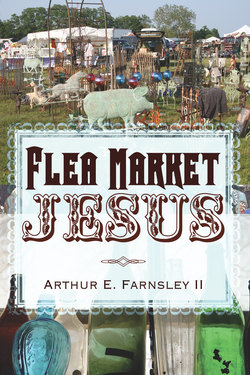Описание книги
Americans live their lives through institutions: government, businesses, schools, clubs, and houses of worship. But many Americans are wary of the control these groups–especially government and business–exercise over their lives.
Flea Market Jesus provides an up-close look at the rugged individualism of those trying hardest to separate themselves from institutions: flea market dealers. Having spent most of his life studying American religious organizations, Art Farnsley turns his attention to America's most solitary, and alienated, entrepreneurs.
Farnsley describes an entire subculture of white Midwesterners–working class, middle class, and poor–gathered together in a uniquely American celebration of guns and frontier life. In this mix, the character «Cochise» voices the frustrations of flea market dealers toward business, politics, and, especially, religion.
Part ethnography, part autobiography, Flea Market Jesus is a story about alienation, biblical literalism, libertarianism, and deep-seated religious belief. It is not about the Tea Party, the Occupy movement, or the Christian Right, but it shines a light on all of these by highlighting the potent combination of mistrust, resentment, and personal liberty too often kept in the shadows of public discourse among educated elites.
Flea Market Jesus provides an up-close look at the rugged individualism of those trying hardest to separate themselves from institutions: flea market dealers. Having spent most of his life studying American religious organizations, Art Farnsley turns his attention to America's most solitary, and alienated, entrepreneurs.
Farnsley describes an entire subculture of white Midwesterners–working class, middle class, and poor–gathered together in a uniquely American celebration of guns and frontier life. In this mix, the character «Cochise» voices the frustrations of flea market dealers toward business, politics, and, especially, religion.
Part ethnography, part autobiography, Flea Market Jesus is a story about alienation, biblical literalism, libertarianism, and deep-seated religious belief. It is not about the Tea Party, the Occupy movement, or the Christian Right, but it shines a light on all of these by highlighting the potent combination of mistrust, resentment, and personal liberty too often kept in the shadows of public discourse among educated elites.
